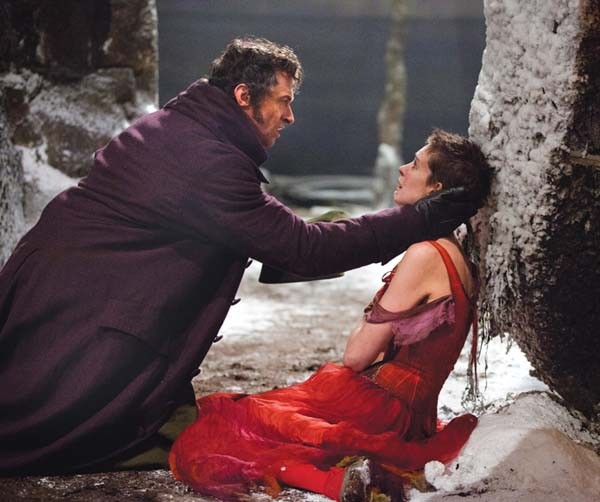More than 30 years after it debuted in Paris, the whole world now can dream the dream and shed the tear — all at once, and at popular prices — for Les Misérables, the pop opera (i.e., Broadway musical) based on Victor Hugo's 1862 novel.
And they should, for this is a moving adaptation, directed with relentless intimacy by Tom Hooper (The King's Speech), and beautifully performed by (more or less) everyone in the cast. Hugh Jackman, Anne Hathaway, Eddie Redmayne and Aaron Tveit handle the heavy bits, with comic relief from the elastic Sacha Baron Cohen and the ever more garish Helena Bonham Carter.
Only Russell Crowe, as the tenacious policeman Javert, sometimes feels out of place, his voice not equal to that of his peers, his scowl a bit too opaque. But his character is intriguing: Raised in poverty, he believes steadfastly in the fairness of the system of justice that's allowed him to advance. He's Antonin Scalia or Condi Rice, and when he faces a moral dilemma, he's too engulfed by his notions of right and wrong to adapt his thinking.
The story, briefly: In 1815 France, after the revolution has dissolved back into a monarchy, and where poor is very poor, Jean Valjean (Jackman) gets out of prison after 19 years for stealing a loaf of bread. He jumps parole to start a new life, but he's pursued by Javert. First he gets caught up in the life of Fantine (Hathaway) and her daughter, the waif Cosette (Amanda Seyfried), and then with a pack of young revolutionaries.
Hathaway performs the show's takeaway song, "I Dreamed a Dream," in one long take and in extreme closeup, an absorbing feat of musical acting — one of many in the film. Hooper's direction is less effective when people sing in ensembles, largely due to the clumsiness of translating that particular element of theater spectacle to the screen. (It's dated and jarring to hear large groups of armed movie characters break into song.)
But the only number that truly bombs is "One Day More," which all the major characters sing from different locations. Cutting back and forth between them deadens the effect this sort of capstone number has when you see it on stage (and not just because it means intermission is coming). The story's themes — freedom, honor, love, justice, forgiveness, redemption — are heavy, yet rarely heavy-handed. And because this opera is Les Miz, it isn't over until the dead lady sings.















